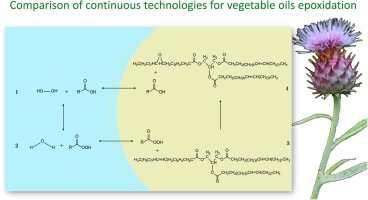Comparison of continuous technologies for vegetable oils epoxidation
T Cogliano, V Russo, K Eränen, R Tesser, M Di Serio, T Salmi
Chemical Engineering Science (2025) 301, 120726
https://doi.org/10.1016/j.ces.2024.120726
Abstract
Epoxidized Vegetable Oils (EVOs) are an important class of chemical compounds obtained from biomass and used as intermediates to produce several bio-products and chemicals, such as hydroxy-alkoxy compounds, diols, amines, and carbonates. Epoxides originating from vegetable oils and their derivatives, namely fatty acids or alkyl esters, are still produced by semibatch technology which suffers from severe mass transfer limitations and long reaction times, thus impairing the final product selectivity and restraining the overall productivity. In this work, two continuous reactor technologies to produce epoxides from vegetable oils were developed and compared. The first configuration, consisting of only one jacketed tubular reactor operated in co-current up-flow mode, showed a good performance at T = 318 K achieving a double bond conversion exceeding 95 % and an epoxide selectivity higher than 90 %. The second technology, where two jacketed tubular reactors connected in series were operated in up-flow mode, gave comparable conversions and selectivity to the previous one, but under somewhat milder conditions, at T = 294 K and 298 K for the first and second reactor, respectively, and in the absence of any added acid catalyst. Following this latter concept, additional experiments were performed in the presence of different vegetable oils as starting materials to confirm the performance with more common feedstocks. Both configurations showed results that clearly exceed the performance of the current semibatch process.

